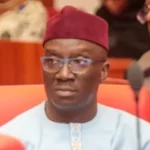Recent happenings in the polity have reminded us that there seems to be a mix-up when it comes to playing politics and public service. They are not the same thing. Naturally, one should not be too surprised about the confusion because it is on the platform of political parties that candidates get elected into public offices in Nigeria. It is for this reason that most positions of authority in government are occupied by politicians at the exclusion of technocrats and non-politicians.
Recall that the Co-founder of BudgIT announced his resignation shortly after being appointed as Technical Adviser to the Minister of State, Budget and National Planning, Clem Agba. BudgIT is a social enterprise that is dedicated to the call for accountability and transparency in governance and a leading fiscal transparency group for building civic awareness on the right of Nigerians to be knowledgeable on public resource management. Onigbinde is well-known as a critic of the Muhammadu Buhari-led administration.
Spearheading the rejection of Onigbinde is the Buhari Media Organisation (BMO), which lambasted Onigbinde for taking up the offer in the same administration he had seriously criticised, saying that his nomination was a travesty that desecrates the honour and integrity of the All Progressives Congress (APC) government. The Chairman of BMO, Niyi Akinsiju stated further that Onigbinde lacked the decency to reject the appointment if indeed he believed the insults he had hurled at the government. Akinsiju added that those who criticise government constructively can take up appointments unlike Onigbinde, who was accused of engaging in name-calling and insulting the President and his supporters.
“If you don’t like a person, you cannot relate with such a person and it is illogical to say you want to work for that same person”, Akinsiju noted, and that the debate was not about party affiliation but ideology, saying that a critic should only puncture government policy and avoid raining insults on people. BMO later congratulated the BudgIT co-founder for resigning the position and that he took the honourable path by that singular action after the outburst.
Earlier in the year, Dr. Festus Adedayo was also appointed as Special Adviser to the Senate President (Media and Publicity), but he was forced to resign, even though his appointment was said to have been based on merit, experience, track record, and competence. Adedayo is a versatile political communicator and member, editorial board of Nigerian Tribune newspapers. The Senate President, Ahmadu Lawan, claimed that he wanted him, but eventually bowed to pressure and reversed the appointment. Just like Onigbinde’s, the appointment of Adedayo had generated heated debate mostly on social media. Supporters of APC had described Adedayo as unfit for the job simply for the offence of being a fierce critic of Buhari.
Adedayo’s response that he had no apologies over his actions, as a fearless professional journalist, was apt. Onigbinde said that he neither deleted nor deactivated his Twitter account as alleged. Criticisms also mounted for his appointment to be reversed while others applauded the offer such as the likes of social commentators and public affairs analysts; former minister of education, Dr. Oby Ezekwesili and political economist, Dr. Joe Abbah, who had served the nation in various capacities, by encouraging him (Onigbide) to prove his mettle by accepting the offer.
From the scenarios that played out, it can be seen that there is confusion when it comes to what is constructive criticism and having disdain for a particular leadership. Criticism is not hatred. That is where we are getting it wrong in this country. The fact that someone is your regular critic does not mean that he cannot be instrumental or meaningfully engaged by offering useful pieces of advice that could spur national development. We should get it right that those who serve in government must only be politicians. This is wrong. Yes, eligible party supporters and politicians should be rewarded for their commitment and dedication. There are still many people out there that can transform this country if given the opportunity without belonging to any party. At times, the views of critics are the needed tonic to make the desired change.
Governance is a serious business that should be all-encompassing, robust, broad and open to diverse shades of opinions and input for better results and outcomes. Hence, the services of Onigbinde and Adedayo should have been retained for their brilliance and experience. However, a social commentator and public affairs analyst should never have it in mind that he must be in government before making a difference. The Consent of the Governed political theory argues that the government’s legitimacy and moral right to use state power is only justified and lawful when consented to by the same people over which the political power is exercised.
This reasoning is strengthened by Article 21 of the United Nations Universal Declaration of Human Rights that states that the will of the people form the basis for the authority of government. Many public affairs analysts that are inspired by the Consent of the Governed theory in evoking literal consent on the logic that valid consent means that final authority, which is the essence of democracy, belongs to the people, rather than the few privileged and elected officials. Therefore, public policies should always be geared towards satisfying the majority of the people.
Society should always appreciate its social commentators and public affairs analysts for what they are contributing to national development in their little way. From personal experience, the so-called ‘enemies’ of the government are true friends in the sense that they are always thinking of how to improve the lives of the people and build the nation. They are constantly ruminating over several key issues at the same time, researching and putting down their thoughts for possible consideration by relevant authorities. They do this, not because they want any political appointment or cheap popularity, but are simply showing their genuine passion towards society.
The least that can be done in appreciation of such doggedness and nationalism is to pause and listen to what they have to offer. At times, some people simply criticise any government in power to get attention, such people are never consistent in what they preach. Onigbinde, Adedayo, and others should continue doing what they are naturally committed to doing; they should not be portrayed in bad light or seen as disgruntled elements. I remembered that had an encounter with Adedayo after the whole brouhaha and I could feel the pressure that he went through when he never lobbied for the rescinded appointment.
On a final note, political leaders should be firm and consult widely while soliciting the support of whomever they feel can genuinely help them provide good governance to the people. They should ever be conscious and wary of sycophants that usually flock around them and could becloud their objective sense of reasoning and judgment. They should endeavour to be tolerant, broad-minded and mature. That is what true leadership entails and how not to take politics too far.
Kupoluyi writes from the Federal University of Agriculture, Abeokuta (FUNAAB).
 Join Daily Trust WhatsApp Community For Quick Access To News and Happenings Around You.
Join Daily Trust WhatsApp Community For Quick Access To News and Happenings Around You.


